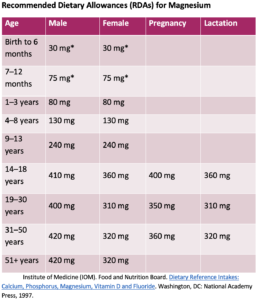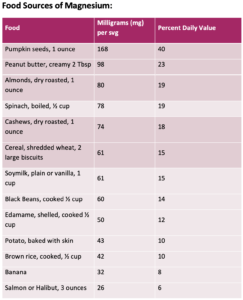Noelle DeSantis, MS, RDN, CDN
DOWNLOAD: Mighty Magnesium_FFHA2020
 Macronutrients such as protein, carbohydrates and fats are well known as important for health. A variety of vitamins and minerals needed in smaller amounts, known as micronutrients, are also needed to build and maintain a healthy body. Magnesium is one of these micronutrients that needs more attention.
Macronutrients such as protein, carbohydrates and fats are well known as important for health. A variety of vitamins and minerals needed in smaller amounts, known as micronutrients, are also needed to build and maintain a healthy body. Magnesium is one of these micronutrients that needs more attention.
Many people are not getting enough magnesium from their diet. Magnesium intake has gone down with the increased intake of processed foods. Low magnesium intake is associated with many chronic diseases, such as heart disease, type-2 diabetes and osteoporosis. Greater magnesium intake helps prevent disease. This article explains why magnesium is so important, and how you can increase magnesium in your diet.
Magnesium – Uses in the body
Magnesium is the fourth most abundant mineral in the human body, so it must be important right? Absolutely! It is needed for building and maintaining healthy bones. It is involved in over 300 enzymatic reactions in the body, including energy production. Many people know Calcium and vitamin D are required for bone building, but what you may not know is that you also need magnesium. In fact, you may increase your risk of heart disease by supplementing Calcium and vitamin D without magnesium. Your body needs magnesium to help process Calcium and vitamin D effectively.
Magnesium is also required for the following metabolic pathways:
- Protein synthesis
- Muscle contraction
- Blood sugar control
- Energy production
- Nerve function
- Blood pressure control
With magnesium playing a role in so many metabolic processes in the body, it is easy to see why it is so important. Adequate magnesium intake promotes health and wellness and can help prevent chronic disease.
Magnesium also plays a role in neurological disorders and has been found to be neuroprotective. Magnesium prevents a process called exitotoxicity. Excitotoxicity causes damage and death to neurons, which are special cells in the central nervous system that send information through our body. At the same time, magnesium is also associated with decreased pain, depression and anxiety. Magnesium supplementation is also used in migraine treatment.

Magnesium intake
According to US national dietary surveys, most people in the United States don’t get enough magnesium from their diet. It is estimated that 36% of children and adolescents and 61% of adults are not getting enough magnesium needed for optimal health.
To make things more complex, a simple blood test is not enough to identify a magnesium deficiency. Our body tightly controls the amount of magnesium in our blood, keeping it within a certain range. Most of our body’s magnesium is stored in our bones. About 25% is found in our muscle tissue and only 1% is found in our blood. This is why it is important to make sure you are getting enough from your diet.

Digestion and Absorption
Magnesium is primarily absorbed in the small intestine. When you are deficient, absorption is increased, and when you have enough, absorption decreases. Pretty cool that our body can regulate so well, right?
It is important to address any other factors that may increase your risk of magnesium deficiency. The following issues can interfere with magnesium absorption:
- High dose zinc supplementation
- Increased gastrointestinal permeability and inflammation
- Decreased stomach acid (can be caused by aging, stress, acid reducing medications)
- Alcohol and caffeine consumption (both increase urinary excretion of magnesium)
- Type two diabetes (increased blood sugar can lead to increased urinary excretion)
Meeting the recommended intake
All of the nutrients in the food we eat work together for disease prevention. This is why eating more magnesium rich foods is a good idea before reaching for supplements. However, for some people, it may be a good idea to take a magnesium supplement. Always talk with your healthcare provider first and find out what form of magnesium supplement is best for you. Not all supplements are absorbed the same, and some can cause a laxative effect. For example, magnesium oxide is often used as a laxative. Magnesium can also interfere with some medications and should be taken separately.

 Tips for including more magnesium rich foods in your daily routine:
Tips for including more magnesium rich foods in your daily routine:
- Add spinach to smoothies or eggs for a magnesium-rich vegetable at breakfast
- Simple snack ideas: Peanut butter and an apple; Peanut butter on celery topped with dried fruit; a handful of almonds and a medium fruit.
- Add pumpkin seeds to your salads at lunch or dinner
- Try edamame as your protein for a stir-fry and serve with brown rice
Eating a balanced diet, including foods such as leafy greens, nuts, seeds, legumes and whole grains is a great way to ensure you are getting your daily dose of magnesium. Magnesium may be a micronutrient, but it plays a big role in overall health. It can help prevent or manage chronic disease, keep bones strong and is used to reduce symptoms such as headache, migraine, fatigue and others.
Take Home Points
- Magnesium is important for metabolic processes in our bodies. It also is important for processing Calcium and vitamin D.
- Most people in the United States aren’t getting enough magnesium in their diet. There is no simple way to test for magnesium deficiency.
- It is usually best to focus on adding magnesium-rich foods to your diet, before taking a supplement.
- Talk to your healthcare provider before taking a magnesium supplement.
References
- Institute of Medicine (IOM). Food and Nutrition Board. Dietary Reference Intakes: Calcium, Phosphorus, Magnesium, Vitamin D and Fluoride. Washington, DC: National Academy Press, 1997.
- Lacey Bromley, Peter J. Horvath, Susan E. Bennett, Bianca Weinstock-Guttman, Andrew D. Ray; Impact of Nutritional Intake on Function in People with Mild-to-Moderate Multiple Sclerosis. International Journal of MS Care 1 January 2019; 21 (1): 1–9.
- Drake, VJ. Micronutrient Inadequacies in the US Population: an Overview. 2017. Linus Pauling Institute, Oregon State University. https://lpi.oregonstate.edu/mic/micronutrient-inadequacies/overview#magnesium
- Kirkland AE, Sarlo GL, Holton KF. The Role of Magnesium in Neurological Disorders. Nutrients. 2018;10(6):730. Published 2018 Jun 6. doi:10.3390/nu10060730
- Razzaque MS. Magnesium: Are We Consuming Enough?. Nutrients. 2018;10(12):1863. Published 2018 Dec 2. doi:10.3390/nu10121863
- American Osteopathic Association. “Low magnesium levels make vitamin D ineffective: Up to 50 percent of US population is magnesium deficient.” ScienceDaily. ScienceDaily, 26 February 2018. <www.sciencedaily.com/releases/2018/02/180226122548.htm>.
Author Information

Noelle DeSantis, MS, RDN, CDN is a registered dietitian nutritionist, specializing in integrative and functional nutrition. Noelle received her Bachelor of Science in Nutrition from San Diego State University, and her Master’s Degree in Nutrition from University at Buffalo. She works for Buffalo Nutrition and Dietetics, PLLC, specializing in neurological disorders out of their office at DENT Neurologic Institute in Buffalo, NY. www.buffalo-nutrition-and-dietetics.com
No conflicts of interest to report.






